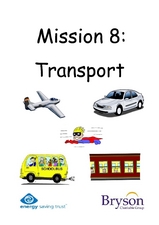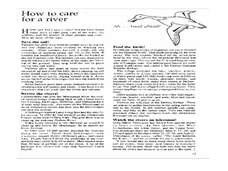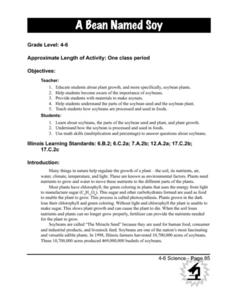Curated OER
Dino Dung!
Students examine how there is more to poop than they think! After reading through material, they answer a series of questions on coprolite, and explore the diet and physical attributes of dinosaurs, as well as their environment.
Curated OER
Mission 8: Transport
In these transportation worksheets, students learn about the various modes of transportation, the energy they use, and ways transportation affects the environment. Students complete a 15 page packet for the activity.
Curated OER
Sand, Sand, Everywhere Sand
Students study the physical characteristics of four types of desert regions. In this desert regions lesson, students watch a video about deserts and discuss the deserts. Students compare the deserts and research the ways humans have...
Curated OER
Ourselves
Students use a website to name and compare external body parts of humans and other animals.
Science Matters
Island Fox Outreach
Off the coast of California lives a wild animal called the Island Fox. Experts discuss the importance of the Island Fox to the Channel Islands and the balance the fox creates within its ecosystem. The lesson concludes with a reading of...
Curated OER
Protect the Primates
Students make posters about saving the primates. In this primates lesson plan, students discuss primates and environmental changes and make posters with pictures about saving primates.
Curated OER
The Delicate Balance - Iowa's Natural Resources
Discover the natural resources in Iowa by studying it's history. In this environmental lesson, your students will observe a topographical map of Iowa and identify where its most valuable resources are. They complete an Iowa name...
Curated OER
Urban Ecosystems 4: Metabolism of Urban Ecosystems
Cities are compared to living, breathing, metabolizing organisms. Fourth in a five-part series of lessons, this one focuses on the flow of materials through a city. Links to interesting websites and images make your delivery of...
Teacher Created Resources
Problem and Solution: By Jove, I Think You've Got It
Through grand conversation, help scholars identify issues that harm the Earth and find solutions on how to solve them. After voting—on what your class deems the most important problem—stretch writing muscles with a problem-solution essay...
Curated OER
Where is Away?
Focusing on where are garbage goes once we dispose of it, learners explore environmental concerns. Using a clear format, this lesson leads learners through a discussion of waste reduction, recycling, and composting. Then, they discuss...
Curated OER
Soybeans: The Miracle Seed
Students discover why soybeans are called the "miracle seeds." They make their own soynuts and share other foods made from soybeans. They create a bulletin board of soybean products.
Curated OER
Basics of Environmental Science
Ninth graders explore environmental concerns of the community and identify the basic needs of people, wildlife and domestic animals. Working both individually and in groups, they also define natural resources and compare and contrast...
Earth Day Network
Filtering Water
See the water filtration system up close with a fun science experiment. Young scientists work for several class periods to design a water filter using household objects, and then decide which filter material would be most effective in...
NASA
NASA: Moving Cargo
How does NASA transport people and cargo to planets? The five-lesson unit breaks down the transportation system that scientists use to transport cargo to space. Pairs team up in order to devise a transportation system that will carry the...
University of California
Energy and Biomass Pyramids
Young scientists play tag as they act out the food pyramid in the ocean ecosystem. Energy circles pass from the smaller prey to the predators and at the end of the activity, a data chart and analysis questions allow pupils to apply their...
Freeology
Earth Day Word Search
Save the planet one vocabulary activity at a time! Offer scholars a chance to locate 20 words with an Earth Day-themed word search.
SRI International
The Water Crisis
Water, water, everywhere, right? Wrong. Learners assess their own knowledge of water availability on Earth. Then, through a reading, a teacher-led presentation, and an activity, pupils learn about the importance of available clean...
UAF Geophysical Institute
System Interactions: The Lorax and the Truffula Tree
If the Lorax were to write a letter, what would he write? Introduce your class to systems and feedback loops through the whimsical stylings of Dr. Seuss. Learners take on the Lorax's point of view to write a letter, among other activities.
Teach Engineering
Linking Sources and Pollutants
Class members use an air quality monitor to measure the amount of gas-phase pollutants emitted by different sources. Groups choose three different sources and make predictions about what the monitors will detect. Teams then expose the...
Teach Engineering
Get the Word Out at McDonald's!
To get the word out that the Great Pacific garbage patch (GPGP) contains millions of pounds of non-biodegrading plastics, individuals research the GPGP and write an article for a newsletter. Researchers present their facts in a way that...
NPR
Define the Plastic Problem
Individuals identify a specific problem concerning plastics and write a problem statement, which describes the problem, explains why it's a problem, and identifies desired solutions.
Beyond Benign
E-Factor: Environmental Impact Factor
Explore how chemical processes reduce production waste. The 19th lesson in a 24-part series has learners explore the impact of green chemistry techniques on waste in production scenarios. They consider petrochemicals, bulk chemicals,...
Beyond Benign
Green House?
A solid foundation is important for all things—especially houses. Learners research different materials for foundations based on environmental impact and cost. They decide whether concrete, insulated concrete, or wood would be best for...
WE Charity
High School–Module 3: Food Waste
Advances in packaging and refrigeration help keep food fresher longer. That's just one of the ways science is addressing global food waste. With the third of five lessons from the WE Are Innovators—High School Modules set, scholars use...
Other popular searches
- Human/environment Interaction
- Geography Human Environment
- Human Environment Interaction
- Human Environment in Peru
- Human Environment Relations
- Human Environment Vietnam
- Human Environment Africa
- Human Environment Asia
- Human Environment Community
- Human Environment School
- Human Environment Problems
- Human Environment Interaction

























